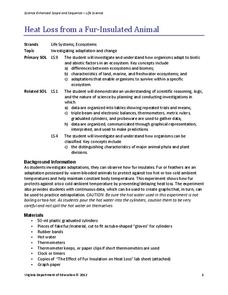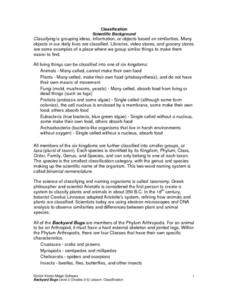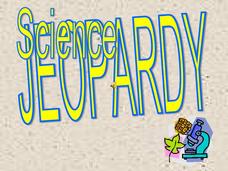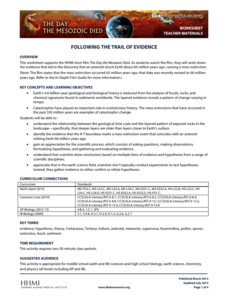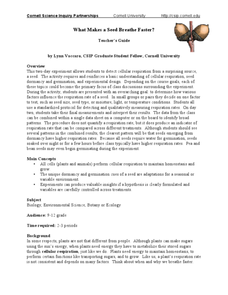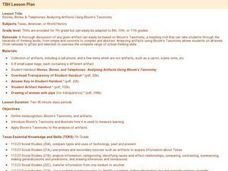Virginia Department of Education
Heat Loss from a Fur-Insulated Animal
How do animals adapt to weather changes? Provide your class with the ability to understand adaptations and body temperature as they participate in this hands on experiment, using fake fur and hot water. Pupils collect data and analyze...
Towson University
Mystery Tubes
How do scientists know they're right? Truth be told, they don't always know. Explore the scientific process using mystery tubes in an insightful activity. Young scientists discover how to approach and solve problems in science, how ideas...
Curated OER
Animal Adaptations: Focus on Bird Beaks
Sixth graders explore bird beaks as animal adaptation. In this bird adaptation lesson, 6th graders conduct an experiment to determine the connection between the shape of a bird's beak and the food it eats.
Curated OER
Introduction to Scientific Theory
Ninth graders explain how scientists set up investigations. For this scientific process lesson, 9th graders review the principles of the scientific method and use these skills to answer an open-ended question about how to set up a...
Alabama Learning Exchange
Amazing Adaptations - Probing Pinnipeds
Fourth graders collect data about the habitats of pinniped adaptations using digital probes. They determine how pinnipeds make adaptations to their natural environment by completing an experiment to determine how human and pinniped...
Curated OER
Refining the Why? Turning Student Questions into Research
Middle schoolers have years of experience when it comes to how their bodies work. Surely they have some questions as well. Here is an opportunity for them to practice the scientific method in an attempt to answer some of those questions....
Curated OER
Backyard Bugs
Explore the concept of scientific classification and the similarities and differences between plant and animal species. Your class will participate in hands-on activities by investigating dichotomous keys and classifying their shoes. To...
Curated OER
Science Jeopardy
Make reviewing evolution, cell division, genetics, cell structure, and scientific method more fun! Science Jeopardy allows teams to choose a category for the question they will address. If you complete the entire game, learners will have...
College Board
2016 AP® European History Free-Response Questions
Why was the Scientific Revolution so significant? What led to Dutch prosperity during the 1600s? To what extent have employment patterns changed in France in the last 100 years? Young historians consider these questions and get solid...
Howard Hughes Medical Institute
Following the Trail of Evidence
One important skill in analyzing scientific evidence is identifying facts versus opinions. Scholars identify pieces of evidence from the film The Day the Mesozoic Died and then discuss this evidence in small groups at the end of each act...
Curated OER
What's the Difference?
Students analyze the similarities in different species. This lesson plan is part of a multi-segmented unit on the diversity of life. In this segment, students classify shoes to mimic the scientific categories of the classification system.
Intel
Insects: The Good, The Bad, The Ugly
What would the world be like with no insects? Ponder this question using a research-based STEM unit that encourages scholars to investigate insects from both a beneficial and hazardous perspective. They learn about insect behaviors,...
Curated OER
Engineering Lessons Adapted for Special Education
Modifying engineering lessons from NASA makes them accessible to a wider variety of learners.
Intel
Forensics: Get a Clue
Although the methods are all scientific, forensic science was started by police officers rather than scientists, who relied on observation and common sense. Young detectives use many tools to solve crimes around the school in a...
Curated OER
Latin Lingo
Did you know that the Greek and Latin root words that make up the scientific name of a creature often describe the animal? All the root words on this list relate to whales and dolphins. Learners examine the scientific names for dolphins...
University of Wisconsin
Bimodel Botany Bouquet
Gardeners are given an individual plant specimen from a bouquet of local rain garden plants. They group up by their plant type and then make observations together, name the plant, and introduce it to the rest of the class. You then share...
It's About Time
Natural Selection
Are you the predator or the prey? Student groups participate in an activity to demonstrate the process of natural selection in a contained environment. After scholars complete the activity and questions, they apply their knowledge to a...
Curated OER
Regents High School Examination: Living Environment 2010
This exam touches upon every topic within the typical first year biology course.. A broad variety of question styles give high schoolers every opportunity to show what they know. Why start from scratch when a comprehensive final exam is...
Curated OER
Regents High School Examination: Living Environment 2009
Emerging ecologists need a full understanding of life, from the inner workings of a cell to the complex relationships among organisms. This examination is meant to assess high schoolers after an entire year course on the living...
Curated OER
What Makes a Seed Breathe Faster?
Here's a five-star lesson plan in which inquisitors conduct sophisticated experimentation with cellular respiration in plant seeds. Placing seeds in a closed system they measure the amount carbon dioxide produced and relate it to...
Curated OER
Habitat Basics
First graders get out and explore two different habitats to examine how each one meets the needs of the plants and animals that dwell there. They discuss what they've learned about animal habitats as they explore the outdoor environment....
Curated OER
Marine Animal and Plant Adaptations
Students examine nature by creating their own animals. In this animal adaptation lesson, students define scientific vocabulary terms dealing with adaptation such as sea stars, sea cucumbers and exoskeleton. Students utilize their...
Curated OER
Stones, Bones & Telephones: Analyzing Artifacts Using Bloom's Taxonomy
Seventh graders define metacognition, Bloom's Taxonomy, and artifacts. They, in groups, try to identify a mystery artifact using the Artifact Analysis sheet. They present their findings to the class.
Curated OER
The Birds and the Beaks
Learners explore the adaptations that birds have. In this adaptations lesson students view a video and create a concept map of birds and their adaptive traits.


